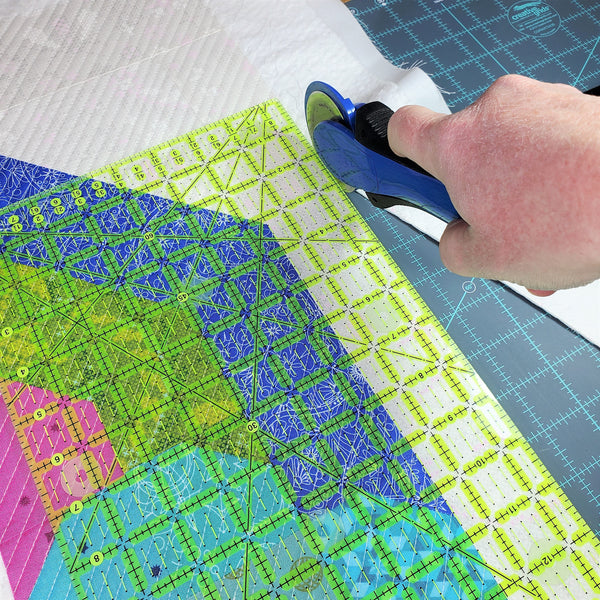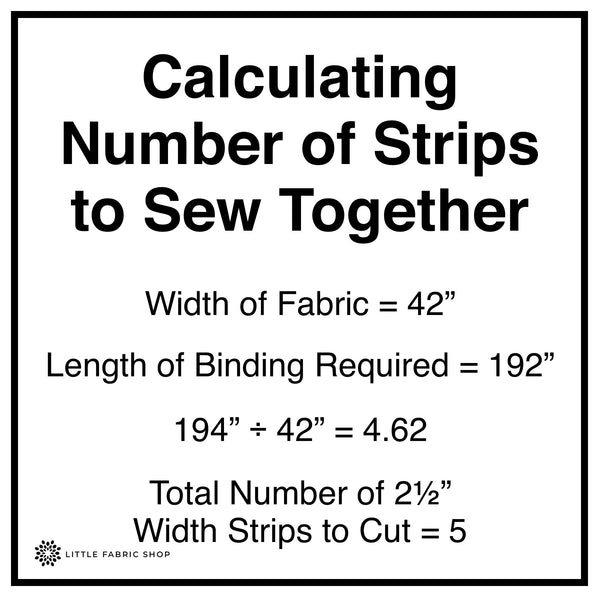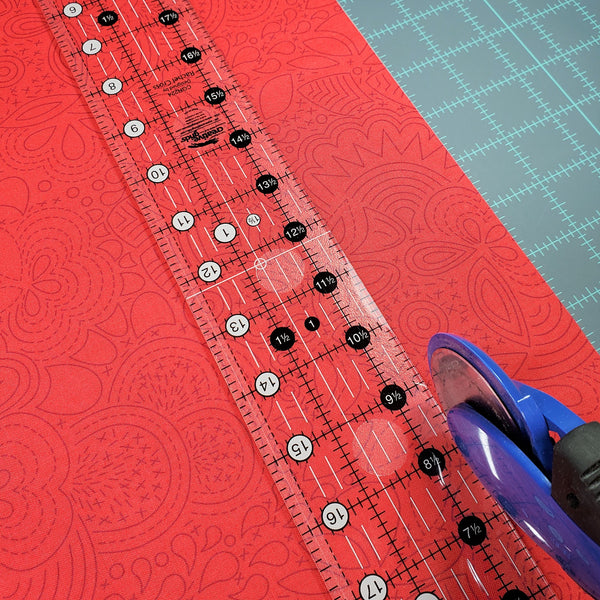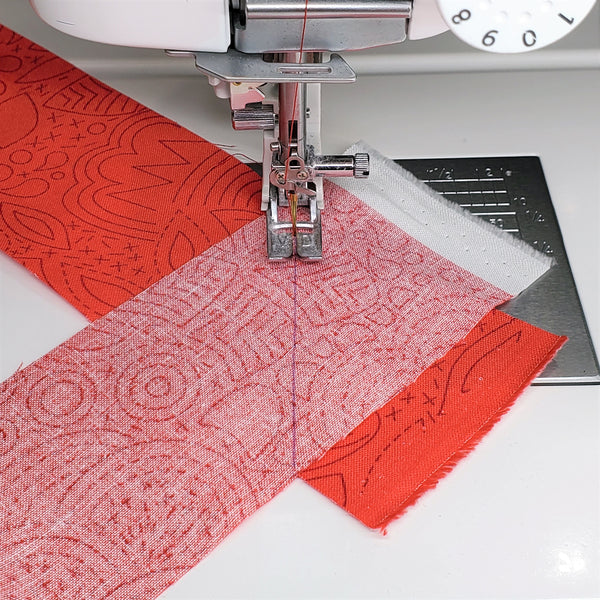How to Bind a Quilt in 6 Easy Steps
If you've made it this far sewing your quilt, congratulations, you're almost finished! Binding a quilt is the very last step in quilt making. We're here to help you put the right finishing touches on your gorgeous quilt, step-by-step. Read on to learn how to bind a quilt the right way.
Quick and Easy Quilt Binding Tutorial
Step 1: Prep Your Quilt for Binding
Prepare your quilt for binding by cutting off any excess batting. Using scissors or a rotary cutter, trim any batting that extends past the edge of the quilt or it will show in your stitching and give a messy appearance. Once you're done trimming, you will have a nice clean edge to work with when you start binding.

Step 2: Make Your Quilting Binding
To begin making the binding, you need to cut strips of fabric to go around the sides of the quilt. To calculate how much you need, start with your quilt's perimeter. If you need a quick math refresher, total your perimeter by adding the length of all four sides together. For example, if you have a quilt that's 42 inches wide and 50 inches long, the perimeter would be 184 inches (42 + 42 + 50 + 50).

After you know your quilt's perimeter, it's a good idea to add an extra 10 inches so you have enough binding to go around the corners. In the previous example, the total amount of binding you will need is 194 inches instead of 184 inches.

Let's keep going with that example to see how to make the next calculation. You are going to be making one very long strip of binding that goes around the whole quilt. To create your binding, it's better to use a starchier fabric so that it will stay flat and in place as you work with it.
This strip should be about 2 ¼ to 2 ½ inches wide. For this project, we will use a 2 ½ inch wide binding. Obviously, you won't cut out one giant 194 X 2 ½ inch-long strip, so you need to piece several smaller strips together to create your quilt binding.
How many strips will you need to sew together to get your 194 inch long binding? To figure it out, divide 194 by the width of the fabric you cut your binding from. If your fabric is 42 inches wide, you will divide 194 by 42, giving you 4.62. You will always round this number up. Therefore, you will need 5 strips of fabric to reach your goal of 194 inches.

Once you do the math and cut out your strips, you're ready for step three!
Step 3: Sew Strips Together
To bind a quilt, you need to sew the strips together into one long strip. There are multiple ways to do this, but we prefer the following method because it helps spread out the bulk created along the seams of the binding.

To sew your strips together: take two strips and place the corners together to form a 90-degree angle (like a letter L with equal sides), with the right sides of the fabric facing one another. Pay attention to the square where the two strips overlap. You want to sew the strips together at a 45 degree angle—a diagonal line through the center of the square.

Trim the excess from the seam, and you have successfully sewn two strips together into one longer strip. Repeat this process by sewing one end of the new longer strip to the next small strip (remember to put right sides together), until you have sewn all of your small strips into one giant strip of binding for your quilt.

Step 4: Iron Your Binding Strips
Next, you will press your binding strip using a steam iron. First, with your wrong side facing up, go through and iron the small flaps left by the seams so that they are open and flat. Then, with the wrong side still facing upward, fold the binding in half (hotdog style) with the wrong sides together, and press them with your iron.

Step 5: Pin Your Quilt
After you press your binding, you can pin the first side to your quilt. Before you pin, line up the binding around the whole quilt to make sure your binding seams won't line up with the corners of your quilt. If any of them do, just move the starting position of the binding down a few inches. The starting position should be around five to 10 inches away from the corner of the quilt.

Once you have the binding lined up around the edges, pin one side to the quilt. The binding goes on top of the quilt (with the quilt facing upward), with the rough edges of the binding lined up with the rough edges of the quilt, and the folded edge of the binding facing inward toward the quilt.
Step 6: Attach Your Quilt Binding
Now, you can finally attach the binding to your quilt! We will use a technique called "the pocket method" for the end of the binding.
To start, unfold a few inches of the very top of the binding. Then, fold the top left corner down at a diagonal to meet the opposite edge of the binding. Refold the binding in half. Then, sew the binding onto the quilt, about ¼ of an inch away from the edge. Stop when you get to a 1/4 inch away from corner.

For each corner of the quilt, you will create a "mitered corner." This means you will fold the binding to create a triangle tab (you will sew the flap down later).
Take the tail of the binding and fold it up away from yourself.

Then fold it back so that the outside edge of the binding continues uninterrupted around the corner of the quilt and the inside edge folds up into the triangle tab.

Pin the binding to the next side of the quilt, and sew down the next side. Repeat until you have gone around all four corners of the quilt and have returned to your starting position.

At this point, you should have some binding left. Trim the binding so there are only a few inches of excess. Tuck those few inches of the tail into the pocket formed where you began sewing your binding.

Sew down the side once more so that the binding is attached to the quilt in one continuous line.

Pin Binding on Reverse Side of Quilt
The next step in binding a quilt is to flip the quilt over and pin the binding down to the other side. You can use straight pins or binding clips. Fold the binding down so that the seam you made around the perimeter is hidden and the binding lays flat against the opposite side of the quilt. Flip the corners inside-out and they will naturally form a mitered corner.

Step 8: Hand Stitch Binding
With fully pinned binding, you can finish your quilt by hand stitching the binding to the other side of the quilt. This can be a time-consuming process, but you will have more control and have a more polished finished product than if you used a machine. So get comfortable, put on your favorite BBC mini-series, and stitch it up! Using a blind stitch, attach the binding to the right side of the quilt, all the way around.

That's it! You have successfully learned how to bind a quilt. Step back and admire your work, take some pictures to share with your friends, or just cuddle up underneath your finished quilt. Then, get ready to start working on your next one. If you need to restock your fabric, shop our cotton quilting fabrics.

We used the Lucky Quilt Pattern and assorted Alison Glass fabric to create this adorable rainbow and sunshine block.
Source: https://littlefabricshop.com/blogs/news/how-to-bind-a-quilt-in-8-easy-steps
0 Response to "How to Bind a Quilt in 6 Easy Steps"
Post a Comment